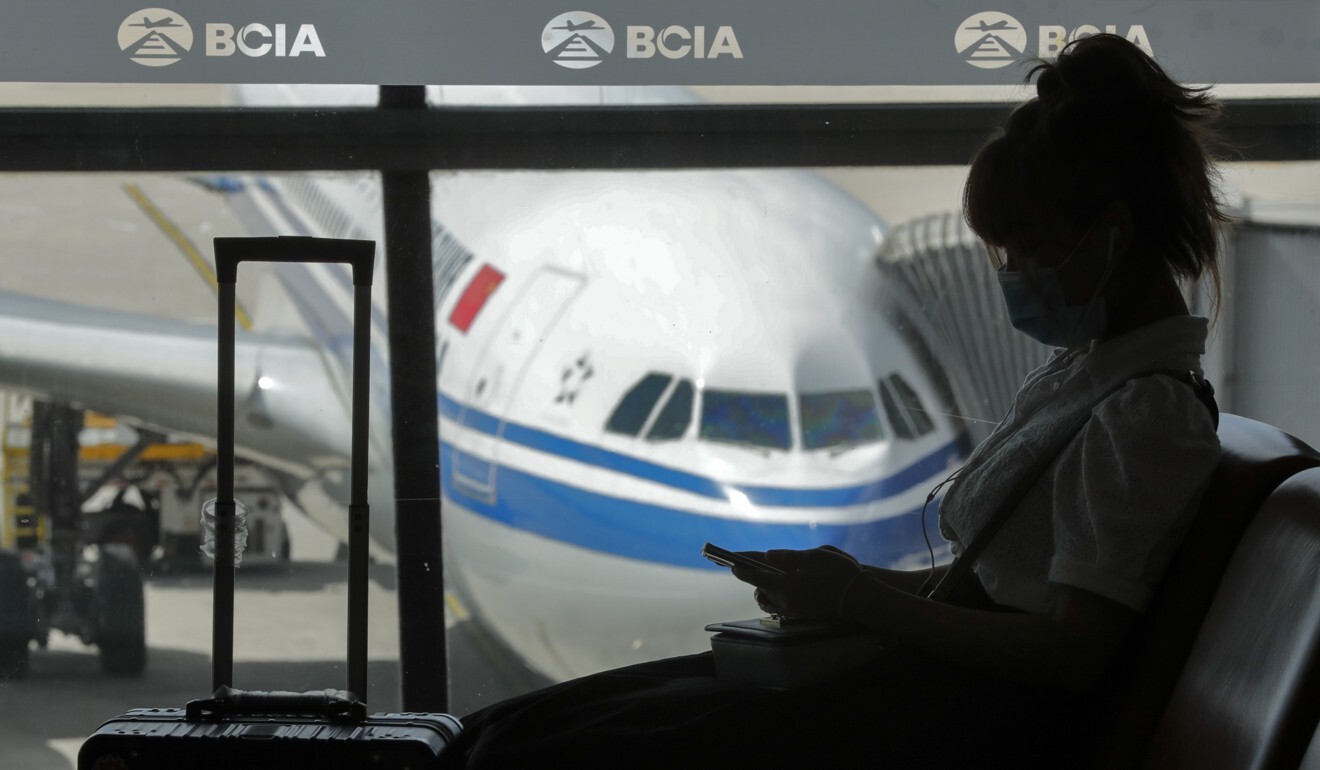
01:22
Japan’s US$700,000 hoverbike provides new toy for supercar enthusiasts

On September 24, when Huawei Technologies Co’s finance chief Meng Wanzhou boarded a chartered Air China plane headed back to Shenzhen after a nearly three-year house arrest in Vancouver, thousands of Chinese patriots hopped online to follow the Boeing 777’s 10-hour homecoming journey in real time and share updated screenshots of its flight path.
Those Chinese plane-spotters relied on Flightradar24, a website that allows internet users to obtain instant information about travelling jets, including origin and destination, position, altitude, speed and aircraft type. Along with other similar platforms, Flightradar24 has been used for years by aviation enthusiasts, airport workers, travel agents and news reporters around the world to keep tabs on flights.
Now these flight-tracking sites and the equipment they use have become targeted by Chinese national security authorities.
On October 31, state-run China Central Television (CCTV) reported that regulators recently confiscated hundreds of so-called automatic dependent surveillance-broadcast (ADS-B) devices, which are used by Flightradar24 and its peers to capture aviation data. Two days later, Flightradar24 was removed from app stores in China.
According to the report, Chinese national security authorities have discovered that multiple overseas institutions have been trying since last year to recruit hobbyists in China to share aviation and aircraft data with them, an action that is considered an illegal overseas transfer of data under Chinese law.
The report also said that these institutions, which were not named, have been providing free equipment and access to aviation data as a bonus for their recruitment drive.

01:22
Japan’s US$700,000 hoverbike provides new toy for supercar enthusiasts
“From our investigation we found that these devices use encryption when they are transmitting and they cover a large amount of data, the purpose of which is exactly to prevent interception by cybersecurity authorities in different countries. This is very clear,” a spokesman for the Ministry of State Security was quoted as saying.
According to the CCTV report, only about 300 ADS-B devices are needed to track the entire airspace of China as the radius of the signal from each device can span 400 kilometres. Each device can share data with an overseas platform on nearly 1,000 flights each day.
The report also highlighted that these ADS-B receivers are capable of gathering information about not just commercial flights, but also military aircraft, which government officials said is a direct threat to China’s military and aviation safety.
CCTV’s report came as China marked the seventh anniversary of its Anti-Espionage Law on November 1. Beijing has also been turbocharging its legislative efforts to regulate data in the country, having enacted the Cybersecurity Law in 2017, followed by the Data Security Law this September, which requires firms to undergo a security assessment to gain approval before sending data abroad.
Beijing’s latest actions against ADS-B devices threaten the development of the niche but growing hobby of flight tracking in China.
To ensure ADS-B signals are received across all corners of the world, flight-tracking platforms recruit volunteers around the world to set up ADS-B devices at home and share them online.
ADS-B devices are normally no bigger than a Wi-fi router and can be bought at under US$100. Flightradar24 volunteers receive an ADS-B receiver for free, in addition to access to a top-tier account worth US$499.99 (HK$3,896) annually.

ADS-B devices receive ADS-B signals, which are usually broadcast by commercial flights to allow public transparency and avoid collisions. The tracking of ADS-B signals has become increasingly popular worldwide after the mysterious disappearance of Malaysia Airlines Flight 370, which vanished en route from Kuala Lumpur, Malaysia to Beijing in March 2014 and remains missing.
Military aircraft, too, are capable of broadcasting ADS-B signals, which have allowed aviation hobbyists to routinely track the whereabouts of US military aircraft on platforms including Flightradar24 and ADSBExchange.com. However, military aircraft almost always turn off their ADS-B signals while in action.
China’s clampdown on the use of ADS-B devices is leaving many flight-tracking platforms and users frustrated and puzzled.
In an email to the South China Morning Post, Flightradar24 said that while Apple had informed them that their app had been removed from the App Store in China and is currently under review, Chinese authorities have not been in touch with the Swedish company.
“We have only seen what has been reported in the news media. We have not received any direct communication from the Chinese government. We’d welcome a dialogue with Chinese authorities to better understand any concerns they may have,” Flightradar24 said, adding that the company is also not aware of any communication initiated by the government with the site’s volunteers.
ADSBExchange.com, another flight tracking site featured by the CCTV news segment, said that it is “outrageous” to accuse the site of taking part in espionage or collecting sensitive military intel. It said that ADS-B signals are not encrypted.
“Every advanced military has the ability to turn their transponder ‘off’ if they do not want to be detectable,” the US-based company said in an email to the Post. “ADSBexchange.com is clear and open about what the collected ADS-B data is used for and everyone viewing ADSBexchange.com can view the same data, regardless of the user’s country of origin or location.”
Hobbyists also said they are disappointed by Beijing’s latest actions.
Speaking to the Post on the condition of anonymity for fear of government retaliation, a Chinese aviation hobbyist, who has been using Flightradar24 since 2014, said he intends to keep using ADS-B devices, which he has owned since 2019.
“I totally disagree that the ADS-B equipment is a threat to national security,” he said, “ADS-B [signals are] like a broadcast that tells others the status of an aircraft, which reduces the burden on [air traffic control].”
Another Chinese Flightradar24 user, who also spoke on the condition of anonymity, said that the CCTV report seems to focus on targeting foreign platforms rather than the hobby of ADS-B signal tracking itself.
“Maybe what CCTV wants to say is that radio hobbyists can track flights via ADS-B devices, but if they share the data with foreign organisations, they are national security threats,” he said, “But I don’t know what will happen if they upload the data to a Chinese website and the data is downloaded by some foreigners.”
Hobbyists and ADSBExchange.com pointed to VariFlight, which accumulated more than 100 million downloads by 2017, as an example of a mainstream Chinese app benefiting from ADS-B signals shared by volunteers. As of Friday, a front-page banner on VariFlight’s website said it is looking for “ADS-B hosts” near 87 airports across 28 countries and regions.
VariFlight did not respond to a request for comment.